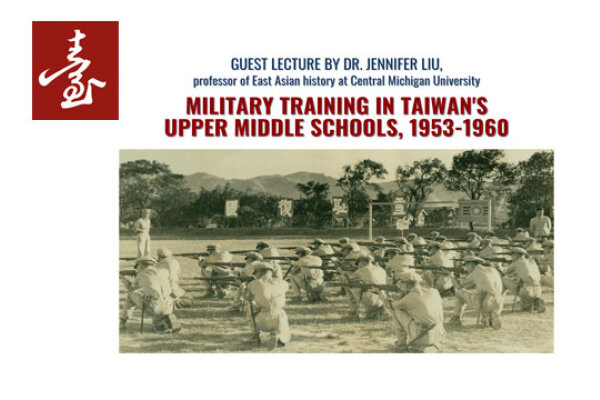12.06.2025

Die Research Unit for Taiwanese Culture and Literature der Fakultät für Ostasienwissenschaften lädt alle Interessierten herzlich zu einem Gastvortrag von Dr. Jennifer Liu, Professorin für ostasiatische Geschichte an der Central Michigan University, ein.
Zeit: 16.06.2025 (Mo.), 18:00–20:00 Uhr
Ort: Ruhr-Universität Bochum, GB 04/159
The Ministry of National Defense implemented military training in Taiwan's upper middle schools (grades 10-12) in 1953 because Chiang Kai-shek felt it was necessary to build a reserve army to counterattack Communist China. The Ministry of Education supported this idea for a different reason: discipline. The competitive and rigorous selection process for military instructors was a cooperative effort between the two ministries. The program incorporated two types of pedagogy: classroom learning and outdoors learning. For males, this included basic training for infantry, weaponry, military hygiene, map-reading, battlefield activities, combat, target shooting,. Female students participated in nearly all of the above activities along with boys, as well as nursing, personal hygiene, and CPR. However, compulsory military training was not with critics, especially from parents, students, and intellectuals who argued that it interfered with students' education and wasted their time. Lastly, an illustration of the impact of military training on student activism and protest in Taiwan is the Liu Ziran Incident, a sensational 1957 murder case that prompted student riots, only this time not against the Nationalists government but rather the US.
Die Research Unit for Taiwanese Culture and Literature der Fakultät für Ostasienwissenschaften lädt alle Interessierten herzlich zu einem Gastvortrag von Dr. Jennifer Liu, Professorin für ostasiatische Geschichte an der Central Michigan University, ein.
Zeit: 16.06.2025 (Mo.), 18:00–20:00 Uhr
Ort: Ruhr-Universität Bochum, GB 04/159
The Ministry of National Defense implemented military training in Taiwan's upper middle schools (grades 10-12) in 1953 because Chiang Kai-shek felt it was necessary to build a reserve army to counterattack Communist China. The Ministry of Education supported this idea for a different reason: discipline. The competitive and rigorous selection process for military instructors was a cooperative effort between the two ministries. The program incorporated two types of pedagogy: classroom learning and outdoors learning. For males, this included basic training for infantry, weaponry, military hygiene, map-reading, battlefield activities, combat, target shooting,. Female students participated in nearly all of the above activities along with boys, as well as nursing, personal hygiene, and CPR. However, compulsory military training was not with critics, especially from parents, students, and intellectuals who argued that it interfered with students' education and wasted their time. Lastly, an illustration of the impact of military training on student activism and protest in Taiwan is the Liu Ziran Incident, a sensational 1957 murder case that prompted student riots, only this time not against the Nationalists government but rather the US.